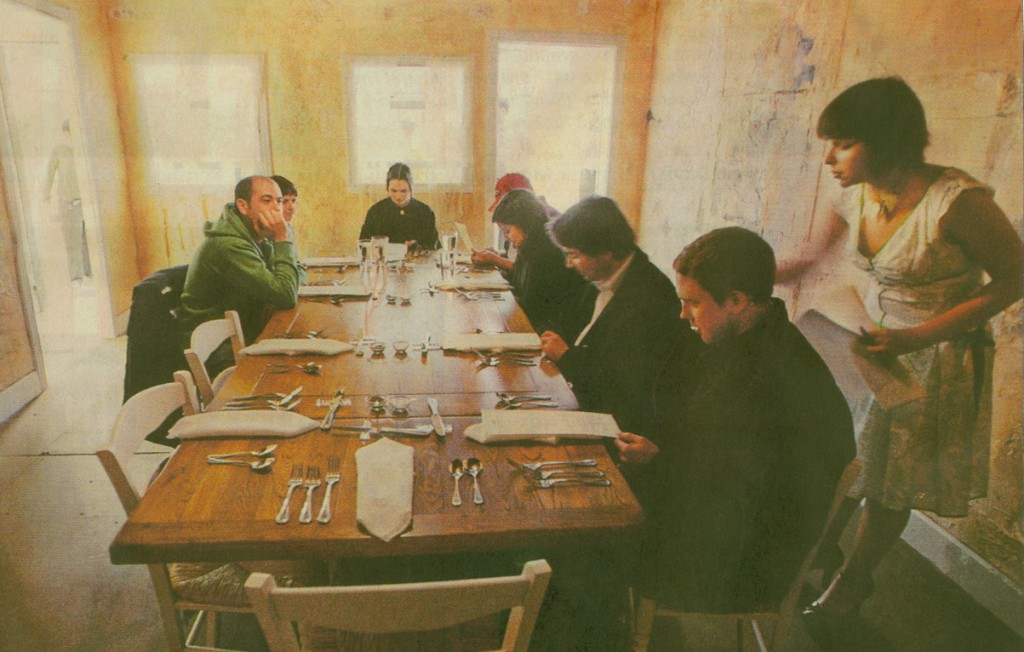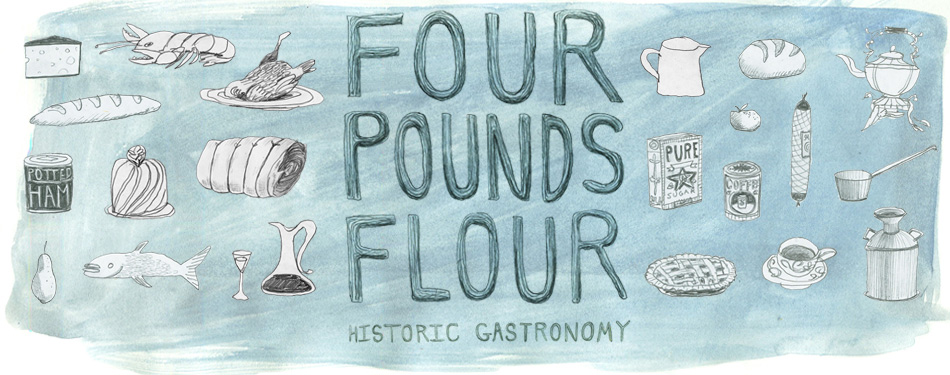 RETHINKING HISTORIC CUISINE: a brief introduction to Four Pounds Flour
RETHINKING HISTORIC CUISINE: a brief introduction to Four Pounds Flour
“I don’t know why old recipes are so evocative, since many of the ingredients are unknown to me or difficult to get, the processes laborious beyond belief, and the results, quite honestly, often nothing I’d want to eat. But they read like a poetry of lost specifics, in which you learn old words and ways to boil, bone, braise, devil, hash, jelly, pot, roast, sauce, steam, stew, and stuff…” (The Education of Oronte Churm)
Why bother deciphering a historic recipe?
You can take a collection of words and measurements written long ago, and turn it into a physical object. You can create something that looks, smells, and tastes just like it did hundreds of years in the past. And that’s the next best thing to time travel: it lets you understand a little bit about another way of life. When I recreate a historic recipe, I not only establish a connection to the past, but I rediscover long-forgotten flavors that inspire my contemporary cooking.
I first learned how to cook historic recipes over a wood stove at my first job in high school. Later, they inspired my thesis, a restaurant reinterpreting historic cuisine for a contemporary audience. Now, it’s led to my first book, Eight Flavors: The Untold Story of American Cuisine.
This blog will focus on, but not be limited to, the history of American cuisine. Sometimes delicious, occasionally disastrous, this is my personal investigation into the history of Americans and their food.
ABOUT THE AUTHOR
 Sarah Lohman is originally from Hinckley, Ohio (near Cleveland), where she began working in a museum at the age of 16, cooking historic food over a wood-burning stove. She graduated with a BFA from the Cleveland Institute of Art in 2005 and for her undergraduate thesis, she opened a temporary restaurant/installation that reinterpreted food of the Colonial era for a modern audience.
Sarah Lohman is originally from Hinckley, Ohio (near Cleveland), where she began working in a museum at the age of 16, cooking historic food over a wood-burning stove. She graduated with a BFA from the Cleveland Institute of Art in 2005 and for her undergraduate thesis, she opened a temporary restaurant/installation that reinterpreted food of the Colonial era for a modern audience.
Lohman moved to New York in 2006 and worked Video Producer for New York Magazine’s food blog, Grub Street. Currently, she works with institutions around the country to create public programs focused on food, including The American Museum of Natural History, The New York Public Library, The Brooklyn Brainery, The Brooklyn Historical Society, Brooklyn Botanic Garden, Institute for Culinary Education, The Great Hunger Museum (New Haven), The Culinary Historians of Southern California, Preacher Gallery (Austin), Museum of Science (Boston), and Smithsonian Museum of American History.
Dubbed a “historic gastronomist,” Lohman works with culinary history as a way to make a personal connection with the past. She chronicles her explorations in culinary history on her blog, FourPoundsFlour.com, and her work has been featured in the New York Times, the Wall Street Journal, The Washington Post, the NY Post, The Atlantic and NPR. She appeared in The Cooking Channel’s Food: Fact or Fiction.
Lohman’s first book, Eight Flavors: The Untold Story of American Cuisine, is out now–order it here!

Pingback: behind the knives: masters of social gastronomy | comme au marché
Pingback: Behind the Knives: Masters of Social Gastronomy
Pingback: History! It’s What’s for Dinner… | American Chop Suey
Pingback: Four Pounds Flour is Looking for an Intern « Four Pounds Flour
Pingback: The Mysteries of Ice Cream | Healthy Tips for Healthy Living
Pingback: Events: Masters of Social Gastronomy Present Food of the High Seas! « Four Pounds Flour
Pingback: TODAY: JAMES FRANCO, FREE CUPCAKES, CHEAP MOVIE TICKETS | the skint
This looks wonderful!!
Very interesting read. Look forward to reading more soon..
Hello,
I am looking for some information on what a home vegetable garden would look like in 1848. My town is doing a an 1848 era vegetable garden for historical purposes. Any help would be greatly appreciated. Thanks!
Jani
Hi Jani,
I am with a living history museum in Pennsylvania that interprets the PA German culture from 1740-1940. We have a raised bed garden that represents roughly the time period that you mention. If you would like to learn more about it please feel free to contact me. If you visit our website, http://www.landisvalleymuseum.org, go to the contact page and then click on Development and email me through there.
Pingback: The first ice cream recipe called for a repulsive ingredient made inside sperm whales | DIGG press
Pingback: 7 Events to Celebrate National Ice Cream Month in NYC - The Culture Files
Pingback: Whiskey For Breakfast and Other Historical Diet Tips - CultureSonar
Frederick Douglass spelled with two S’s :)
Looking forward for the book, sounds really interesting.
Hye Sarah,
I love history very much that anything related to it i adore reading it. I love love your blog as i find it unique. Its about food but with a twist of the heritage of it. Its amazing. I start reading about ‘my book on sale’ and it given a wider knowledge about the history of how Indian food came along to the states. I tried to search for a comment button but can’t seem to find it.
May i know how to follow you?
Thank you
Myris
Read your excellent book twice and will be doing a presentation on it. One question: you say soy sauce is the third bestselling condiment in the US. I can’t find corroboration of that. In fact, Statista.com doesn’t even rank it high in terms of overall condiment sales. Can you lead me to your source? Thank you. P.S. I occasionally write for The Wall Street Journal.
Congratulations on the great review in the New York Times!http://www.nytimes.com/2017/01/06/books/review/chow-chop-suey-food-city-eight-flavors.html?_r=0.
Looking forward to reading the book sometime soon —
Very good read. Enjoyed it very much. Keep up the good work.
Pingback: Clean meat can’t replace traditional meat because there’s no such thing as “traditional” food – TV Aerials Middlesbrough
Pingback: Clean meat can't replace traditional meat because there's no such thing as "traditional" food | all new
Why can I find little or no information about you? As someone who comes across as well known and established when I tried to search for you to see what “credentials” you have and why I should pay attention to your opinions, all of the results were either from your own website and a few other sites mentioning your book. I wanted to get a sense that you are known in the publics culinary eye and failed. You may be the bee’s knees, but a quick Google search does not give that impression.
Hi “John Doe,” I can’t control Google. So either do a more in depth search, or feel free to stop by my Press page for links to articles and reviews: https://fourpoundsflour.com/press-2/
Pingback: How Grape-Nuts Ice Cream Became a Cult Favorite – Breaking News Today
Pingback: How Grape-Nuts Became a Cult-Favorite Ice Cream Flavor – Best weight loss tips
Pingback: A Culinary Tour of the Lower East Side - The Bowery Boys: New York City History